- Home
- Steve Hockensmith
S Hockensmith - H03 - The Black Dove
S Hockensmith - H03 - The Black Dove Read online
ALSO BY STEVE HOCKENSMITH
Holmes on the Range
On the Wrong Track
STEVE HOCKENSMITH
ST. MARTIN’S MINOTAUR
NEW YORK
This is a work of fiction. All of the characters, organizations, and events portrayed in this novel are either products of the author’s imagination or are used fictitiously.
THE BLACK DOVE. Copyright © 2008 by Steve Hockensmith. All rights reserved. Printed in the United States of America. No part of this book may be used or reproduced in any manner whatsoever without written permission except in the case of brief quotations embodied in critical articles or reviews. For information, address St. Martin’s Press, 175 Fifth Avenue, New York, N.Y. 10010.
www.minotaurbooks.com
Library of Congress Cataloging-in-Publication Data
Hockensmith, Steve.
The black dove : a Holmes on the range mystery / Steve Hockensmith.—1st ed.
p. cm.
ISBN-13: 978-0-312-34782-6
ISBN-10: 0-312-34782-0
1. Cowboys—Fiction. 2. Brothers—Fiction. 3. Private investigators—Fiction. 4. Doyle, Arthur Conan, Sir, 1859-1930—Influence—Fiction. 5. Triads (Gangs)—Fiction. 6. San Francisco (Calif.)—Fiction. I. Title.
PS3608.O29 B63 2008
813'.6—dc22
2007039976
First Edition: February 2008
10 9 8 7 6 5 4 3 2 1
FOR MAR, FOREVER
PRELUDE
Or, Killing Time
I don’t know who first said, “Good things come to those who wait.” I just hope it’s not in the Bible, as blasphemy’s hardly the best way to begin a new book. Still, it must be said: Whoever it was, Ben Franklin or Bill Shakespeare or Moses, he was a god damn dolt.
Which puts me and my brother in good company, actually, for we are god damn dolts ourselves.
“Wait here,” we’d been told. So there we waited, though surely we’d seen nothing that day that might suggest good things would be coming our way anytime soon. Quite the opposite, in fact.
We were, after all, poking our noses into a murder in what some would consider the most sinister section of the world’s wickedest city—Chinatown in San Francisco, California. Why, in hindsight, “god damn dolts” doesn’t even do it justice. For stupidity such as we were displaying, there are no fit words in the English language, and the best I can do to sum it up is pause here to spit.
“You really think we’re gettin’ anywhere with all this?” I asked my brother a few minutes after our host hurried from the room, leaving us alone.
“Even if we ain’t, we are,” Gustav said—and said no more.
And folks call the Chinese inscrutable. When my elder brother’s got his mind fixed on a mystery, there’s just no scruting the man.
Take what he was doing just then as a for instance—scuttling across the floor on all fours. A person not in the know might’ve assumed he was succumbing either to some kind of conniption or the sudden, inexplicable conviction that he was, in fact, a cat.
Me, I knew better. What Gustav believed himself to be was a detective—one modeled upon the detective. And if the late, great Sherlock Holmes would get to wriggling around on rugs whenever he searched a room, why then, my brother just had to go and do the same.
“ ‘Even if we ain’t, we are?’ ” I said to him. “Sweet Jesus—your answers are harder to figure than most people’s questions.”
“Look,” Gustav growled as he crawled along, his nose so close to the floor it could almost plow a furrow in the plush red carpet, “we didn’t have no choice but to come in here and see what could be seen. If it don’t pan out, at least we can check it off the list and get to huntin’ for clues elsewheres.”
“You got a particular ‘elsewheres’ in mind?”
Gustav picked up a tiny puff of white fluff, sniffed it, then tossed it over his shoulder and got back to eyeballing the floor.
“Nope. But don’t you worry. We’ll pick us up a new trail soon enough. We done touched a nerve here.”
“Oh, well, then—my faith has been restored. If gettin’ on people’s nerves is all it’ll take to crack this case, then indeed the right man is on the job.”
My brother scowled at me over his shoulder, but before he could reply in kind, one of the room’s two doors swung open, and a pair of Chinamen came striding in. They were dressed identically in loose-fitting black blouses and trousers, with flat-topped, round-brimmed hats upon their heads.
We’d never laid eyes on either fellow before, but we’d seen their like a lot lately: They were highbinders, hired killers working for Chinatown’s “fighting tongs.”
“You know,” I said under my breath, “if this is that new trail you promised, I don’t think I care to follow it.”
“Me, neither,” Gustav said, pushing himself up off his knees.
There was even less to like a moment later, when the room’s other door—the one my brother and I were darting toward at the time—flew open, and two more highbinders stepped inside.
Of course, there’s another name for such thugs as we were facing, one you’ve most likely run across in newspaper or magazine stories: “hatchet men.” And if you’ve ever wondered whether Chinatown outlaws are slapped with that handle for the obvious reason, I can provide an authoritative answer for you based on what happened next.
They are.
1
EXPERIENCE
Or, Gustav and I Are Most Definitely Not in the Pink
It wasn’t just fear I felt as I faced those highbinders and their hatchets. I was almost as surprised as I was petrified. Not that I was about to die, mind you. It was more the manner of it.
An early death was a possibility—perhaps even a probability—of which I’d been acutely aware almost from birth. As a lad on the family farm in Kansas, I figured it was smallpox, starvation, or Sitting Bull that’d get me. After most of my kin were indeed got (by a flood, as it came to pass), I took to drovering with my brother Gustav, thus giving myself ample opportunity to meet my maker via stampede, saddle-dragging, bull’s horn, or rustler’s bullet. On top of which, my brother had me half-convinced my big mouth was going to get me brained in a saloon brawl sooner or later.
So imagine my dismay upon learning I’d end my days being chopped into chow mein in Chinatown. That one I didn’t see coming. Though perhaps I should have, given our luck of late.
Our detour into the peculiar began a full year earlier, in June of 1892, when a fellow puncher passed along a magazine story he thought might amuse us: “The Red-Headed League” by Dr. John Watson. The joke being that Gustav and I could be charter members of any such league ourselves, since we each have hair the crimson of cardinal feathers.
But handing us “The Red-Headed League” turned out to be much more than just a jape. It was like giving lil’ Chrissy Columbus his first toy boat, or telling Paul Bunyan he’s just not working out as a seamstress and shouldn’t he consider a line of work more suiting his size?
It was, in other words, the sort of seemingly meaningless gesture that can change lives (and perhaps end them).
You see, Gustav had long been chafing in the saddle, and not just in the way that leaves you walking bowlegged. A finer cowhand than he you could not chance to meet, yet my brother was feeling ever more thwarted nursing other men’s cattle for a dollar a day. Life as a cowboy requires much in the way of skill and grit, but your brains you can leave wrapped up in your war bags. And Gustav—he was itching to unpack his and put them to work.
“The Red-Headed League” showed him how, for at its center was a man who made his way in the world not by the sweat of his brow b
ut by the shrewdness of the mind beneath it. Details and data were his stock in trade, and these are free to all . . . who have the keenness of vision to see them clearly.
The man called himself “a consulting detective,” and his name, of course, was Sherlock Holmes. He was dead, we later learned—lost to a waterfall under circumstances most mysterious. But in my brother his spirit found itself a new vessel.
An imperfect one, though, as even Gustav would admit. Sharp of eye though he may be, my brother is also utterly void of learning. The only letters he knows are the ones he’s seen on brands, and if they’re not burned into cowhide, he can’t make head nor tail of them. But that hasn’t stopped him (and his tag-along baby brother) from pursuing a career in the detectiving trade—though it does partially explain why said pursuit has largely been in vain.
Take our last visit to an actual detective agency, for example.
“Fill these out,” a dapper, slender, profoundly bored-looking fellow told us when we walked in and (after a good three minutes being ignored) caught his eye. He opened a desk drawer and produced a pair of forms bearing his employer’s seal: the all-seeing eye of the Pinkerton National Detective Agency.
He tossed a couple stubby pencils atop the sheets of paper, then jerked his head at a bare table in a corner at the back of the room.
“Over there.”
“Yessir. We’ll have ’em back to you in two shakes,” I said with a smile.
The Pinkerton just stared at me silently through droopy-lidded eyes. Two shakes or two million, it clearly made no nevermind to him.
“I’ll fill one out for you first,” I whispered to my brother as we walked past the filing cabinets and mahogany desks that filled the smallish office. “Then we’ll trade sheets, and I’ll do one for myself.”
We sat down and huddled together over the employment forms.
“Make sure the handwritin’ don’t look the same,” Gustav said softly. “Booger one of ’em up a bit. You know—write it out left-handed or upside down or somethin’.”
“Yeah, yeah. Sure.”
I got to work on my brother’s application.
Name: Gustav Dagobert Amlingmeyer
Aliases: “Old Red,” “That Little Quiet Feller”
Address: The Cosmopolitan House (Hotel), 511 Eighth Street, Oakland
Telephone exchange/number: I have no earthly idea
Date of birth: October 22, 1866
Place of birth: Marion County, Kansas
Height: Five feet, six inches (I guessed.)
Weight: 125 pounds (I guessed again.)
Hair: Red
Eyes: Blue
Scars, birth marks, disfigurements, or other notable physical features: Bullet hole on right side below rib cage; old rope bums on hands; various and sundry nicks, cuts, and abrasions; freckles on arms and shoulders; an exceptionally thick mustache; an exceptionally hard head
Education: Enough (I lied.)
Previous occupations: Farmhand, cowhand, freelance genius
Law enforcement/private investigation experience: Oh, shit (I almost wrote.)
I leaned closer to Old Red, who was hunched over pretending to scribble on the form before him.
“They’re askin’ if we ever been lawmen before. Should I mention the S.P.?”
The memory of our brief, disastrous tour of duty as agents of the Southern Pacific Railroad Police puckered up Gustav’s puss like a big chomping bite of raw lemon.
“Well, hell,” he groaned. “It is the only time we had real badges pinned to us.”
“But we was fired.”
“We quit before we was fired.”
“Yeah, but a lot of folks died before we quit.”
“Most of ’em woulda died whether we’d been there or not,” my brother pointed out halfheartedly.
“How ’bout the train that got blowed up, then? It’d still be haulin’ folks up and down the Sierras if we’d never stepped aboard. And if the Pinks check on us with the S.P.—and the Pinks bein’ the Pinks, they will—then it’ll all come out.”
“Fine, then. Don’t mention the S.P. Just say that . . . .”
Gustav screwed up his face again, silent for a moment as he dictated in his head.
“Say we’ve made a scientific study of the detectin’ and deducifyin’ methods of Mr. Sherlock Holmes.”
Got it.
I looked back down at the line about experience.
None, I wrote.
Old Red was watching me, though, so I added a few more words for appearance’s sake.
But we’re young and eager to learn—and cheap, to boot.
“Alrighty,” I said. “Let’s trade.”
We swapped sheets fast, Gustav hacking out a phony little cough to cover the sound of rustling paper. He needn’t have bothered—no one was paying us any mind. The slick-looking Pinkerton was filling out paperwork of his own, while the only other person in the room—a prim, pretty office girl who had so far evaded my every attempt at eye contact—was clacking away on one of those ear-pummeling “type-writing” contraptions.
I licked the tip of my pencil and got back to work.
Name: Otto Albert Amlingmeyer
Aliases: “Big Red” (frequently used by friends and colleagues), “You Handsome Devil You” (frequently used by female acquaintances)
Address: The Cosmopolitan House, Eighth Street, Oakland
Telephone exchange/number: If the Cosmopolitan House has a telephone, its used about as often thereabouts as a broom, feather duster, or mop—which is to say never.
Date of birth: June 4, 1872
Place of birth: The kitchen table
Height: Six feet, one inch
Weight: 200 pounds, more or less (It was actually more at the time—city living does tend to soften a man.)
Hair: Red
Eyes: Blue
Scars, birth marks, disfigurements, or other notable physical features: Damned ugly knees and elbows (from being dragged halfway across Texas by a roped steer); bite marks on foot (from finding a Gila monster in my boot the hard way); Cross J brand on right buttocks (it’s a long story)
Education: Six years of formal schooling; a lifetime of informal schooling via newspapers, magazines, books, open ears, open eyes, and an open mind
Previous occupations: Farmboy, granary clerk, cowboy, drifter, yarn-spinner
Law enforcement I private investigation experience: I am pleased to report that I remain unmolded clay, unmarred by the fumbling fingers of employment with government authorities or private parties unequal to the exacting standards of the Pinkerton National Detective Agency.
“There,” I said, jabbing down the final period. “Done.”
Old Red glanced back at the thin Pink, who was listening listlessly to a pair of mumbly men who’d just wandered into the office. “You think we got much of a chance?”
“Sure. That feller wouldn’t have asked us to fill out these forms if—”
The Pinkerton opened his desk drawer and pulled out two more applications.
“Fill these out.” He jerked his head at the table we were using. “Over there.”
“Well, anyway,” I muttered. “I’ll do my best to sweet-talk him.”
We passed our competition on the way to the front of the office. They were of a type we’d seen often since arriving in the San Francisco area a month before: men with shuffling gaits and downcast gazes wearing well-tailored suits that seemed a size too large. The Panic (as the newspapers had taken to calling the latest wave of bank runs) had dumped hundreds of such unfortunates on the streets in recent weeks, and it was remarkable and sad to see how quickly a proud, prosperous businessman could shrivel into a desperate, hungry beggarman.
Still, I couldn’t feel too awfully bad for most of them. At least they’d had heights from which to fall. Gustav and I were pretty much born at rock bottom and had somehow managed to sink even lower from there. Now we had nowhere to go but up—or so I hoped.
“Here you are, sir—our ‘c
ur-icky-cullum vetoes,’ ” I said to the Pinkerton, sliding our applications onto his desk. “I’d just ask you to keep in mind as you look ’em over that me and my brother are men of experience, men of the world. Men, to boil it down to its essence. And while the, shall we say, unconventional credentials of men such as ourselves might be hard to quantify on paper, they have imparted to us the very qualities that Mr. Allan Pinkerton himself would have sought when recruiting—”
“Well, well Brothers, huh?” the Pink cut in, looking up from the forms to give us each a quick, up-and-down once-over.
We hardly made a matching pair, aside from our scarlet hair. Not only do I have a few inches and more than a few pounds on my brother, I’d citified my look over the last weeks, swapping out my work denims and boots for a secondhand suit and patent leather shoes. I’d even gone so far as to buy myself a bowler. But Old Red had no interest in slicking himself up, and he still dressed as if we might be ordered to hop atop a horse and round up strays any minute.
“Yessir—brothers,” I said. “Though I reckon nobody’d mistake us for twins . . . thank God.”
Gustav rolled his eyes.
“No, twins you’re not,” the Pinkerton replied, his lips so pursed they bent his feathery little mustache into a gray V. “Funny thing, though. Your handwriting’s absolutely identical.”
My brother shot me a glare hot enough to pop corn by.
“Ho ho—you are a detective, ain’t you!” I said to the Pink. “You see, we’ve got ol’ Mrs. Wiegand to thank for that. She was our schoolteacher back in Kansas. How that woman fussed about penmanship! Made us write the same sentence over and over till the letters looked exactly—”
“And no experience, huh?” the Pinkerton said, looking back down at the papers on his desk.
“Not of the kind y’all were askin’ about on them forms. But experiences, we’ve had aplenty. Rough and tumble stuff. Just the kind of thing that prepares a man for work as a—”

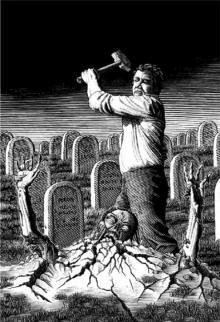 Dawn of the Dreadfuls
Dawn of the Dreadfuls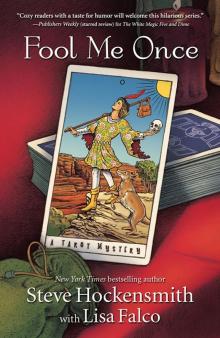 Fool Me Once: A Tarot Mystery
Fool Me Once: A Tarot Mystery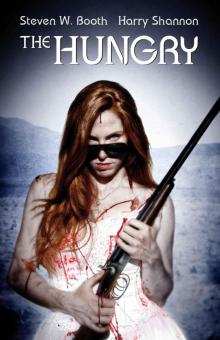 The Hungry
The Hungry Naughty: Nine Tales of Christmas Crime
Naughty: Nine Tales of Christmas Crime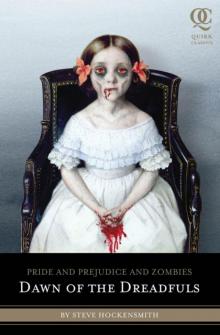 Pride and Prejudice and Zombies: Dawn of the Dreadfuls papaz-1
Pride and Prejudice and Zombies: Dawn of the Dreadfuls papaz-1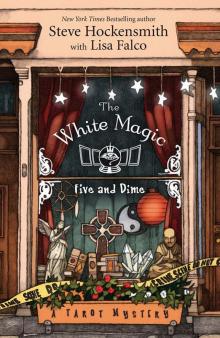 The White Magic Five & Dime (A Tarot Mystery)
The White Magic Five & Dime (A Tarot Mystery)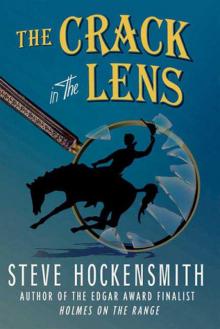 The Crack in the Lens
The Crack in the Lens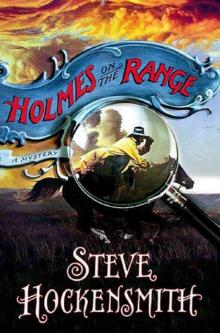 Holmes on the Range
Holmes on the Range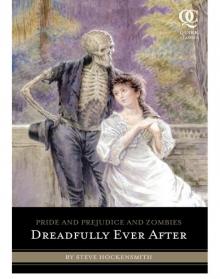 Dreadfully Ever After
Dreadfully Ever After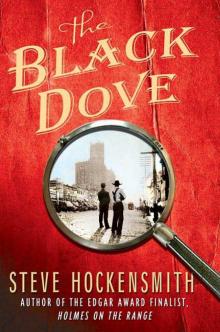 S Hockensmith - H03 - The Black Dove
S Hockensmith - H03 - The Black Dove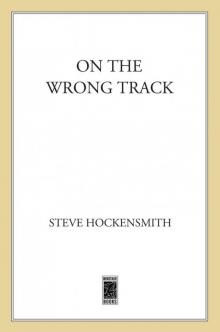 On the Wrong Track
On the Wrong Track Naughty-Nine Tales of Christmas
Naughty-Nine Tales of Christmas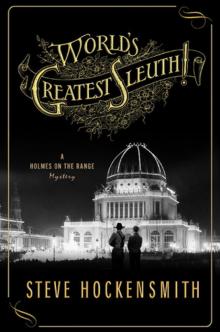 World's Greatest Sleuth!
World's Greatest Sleuth!